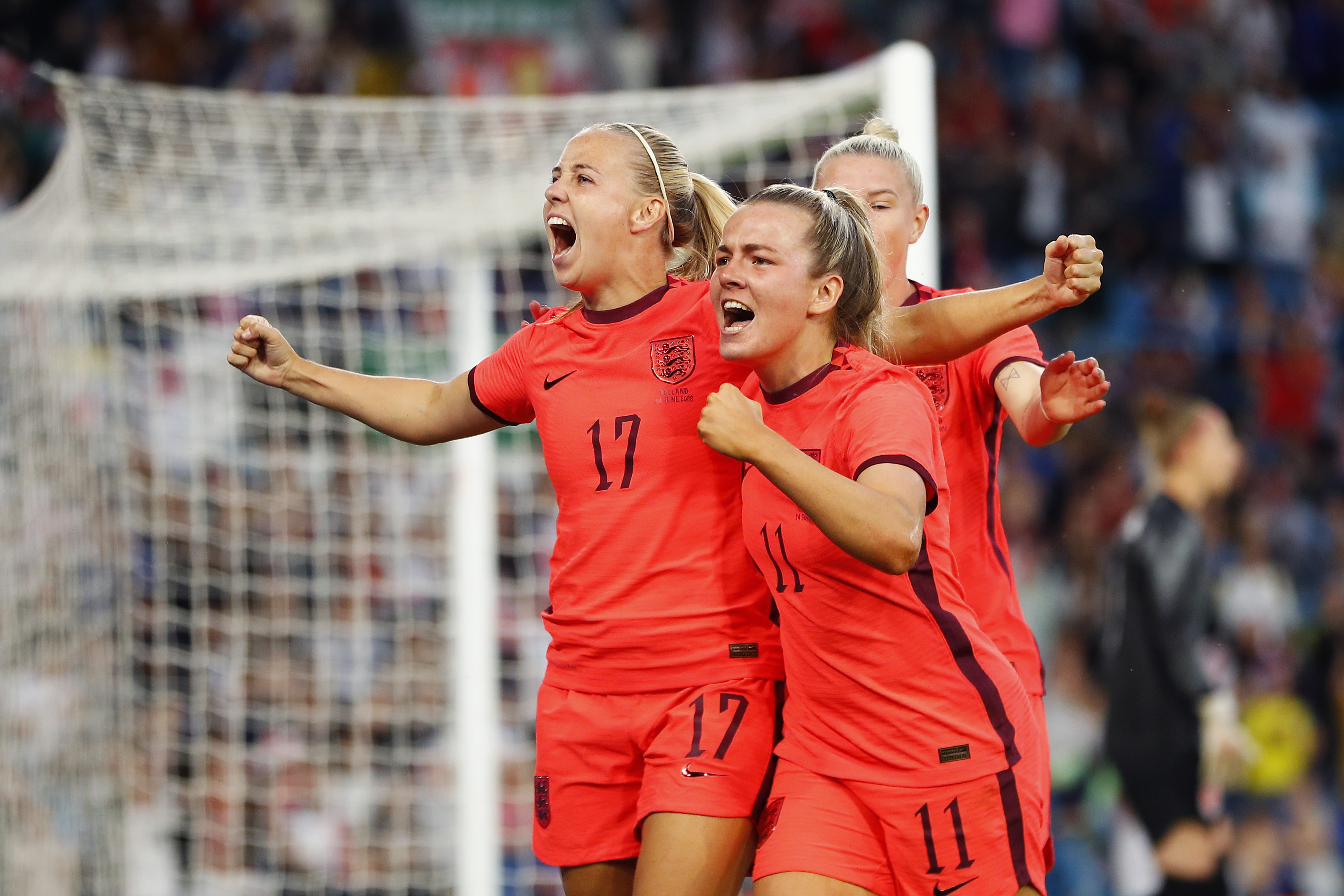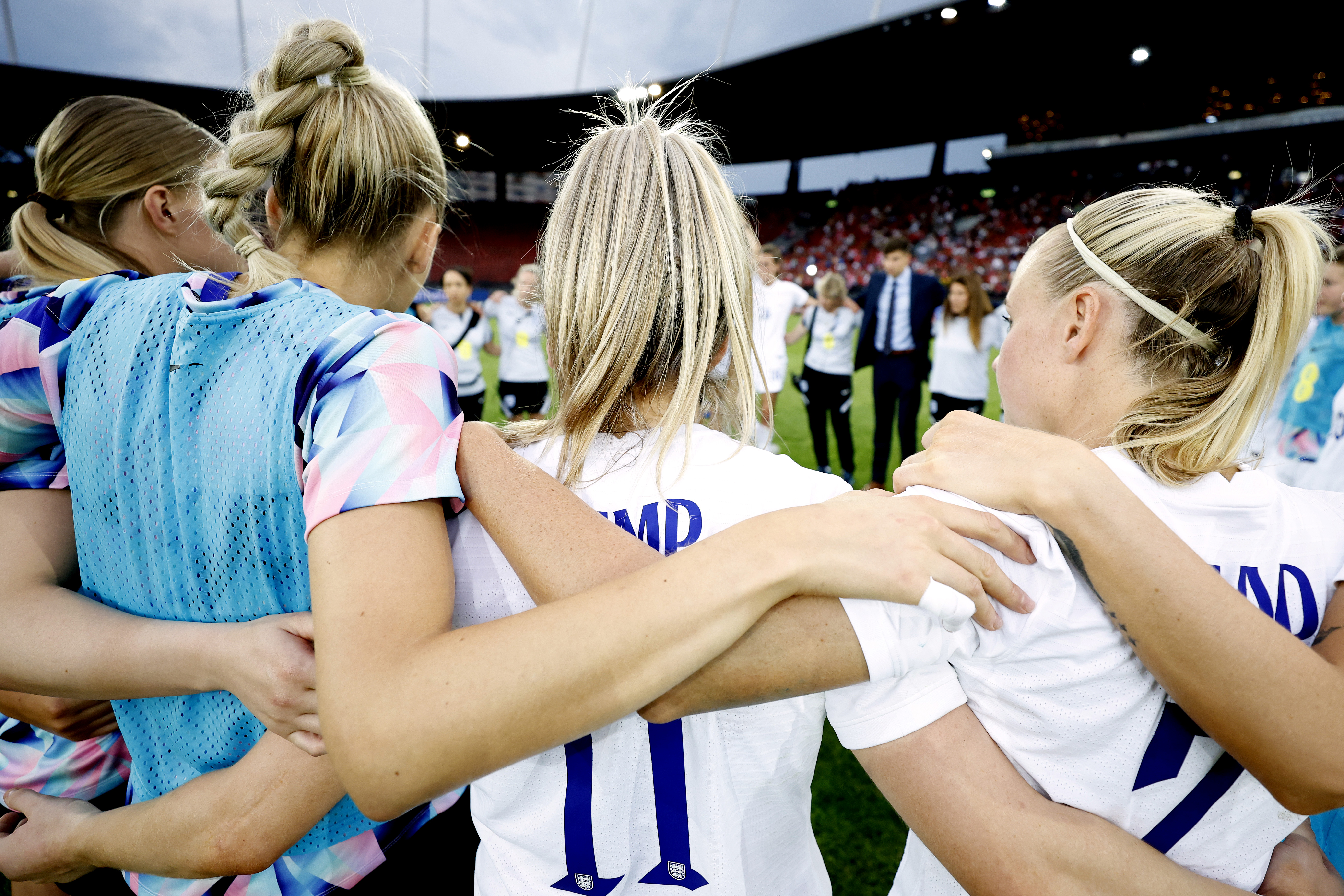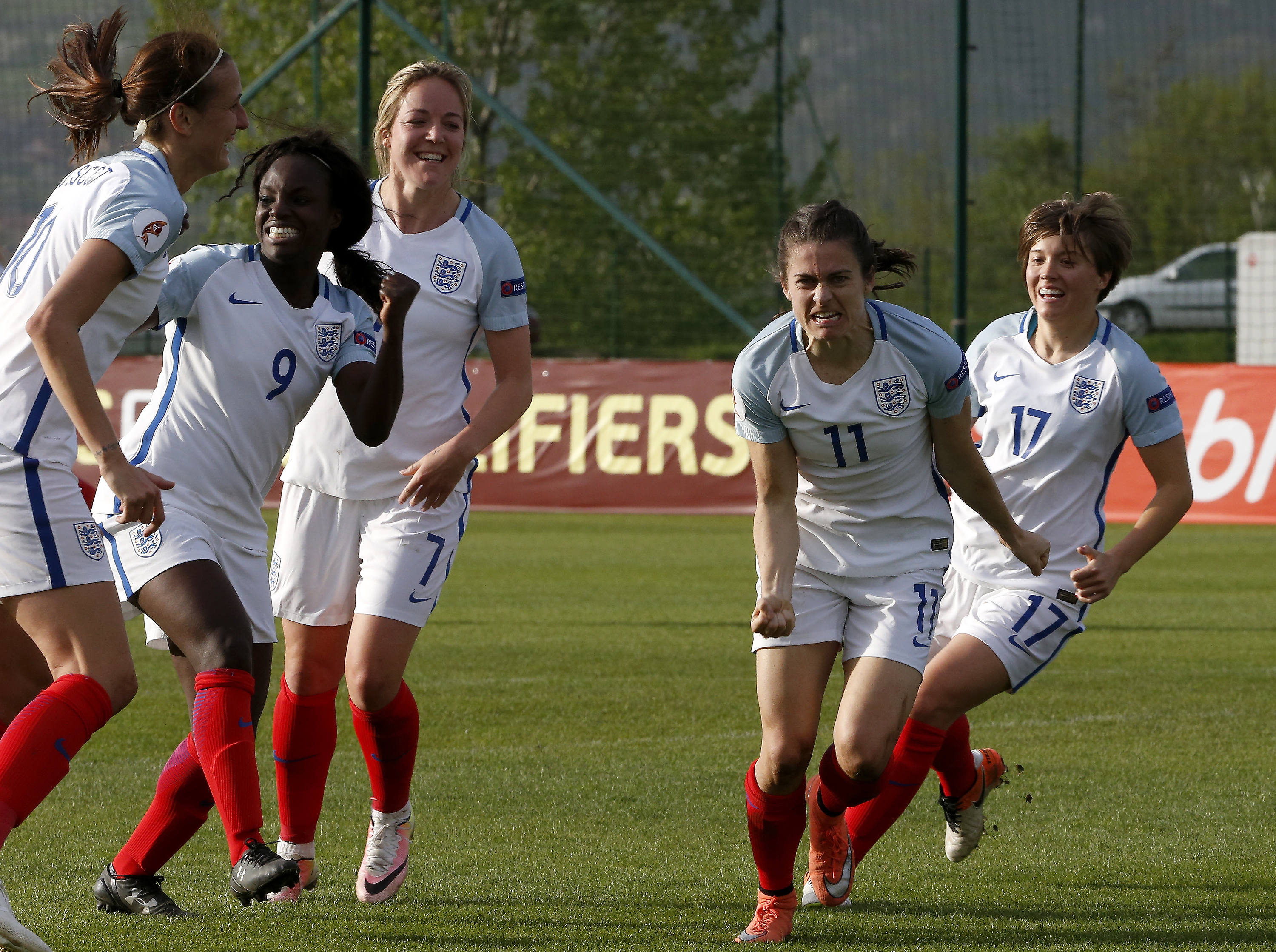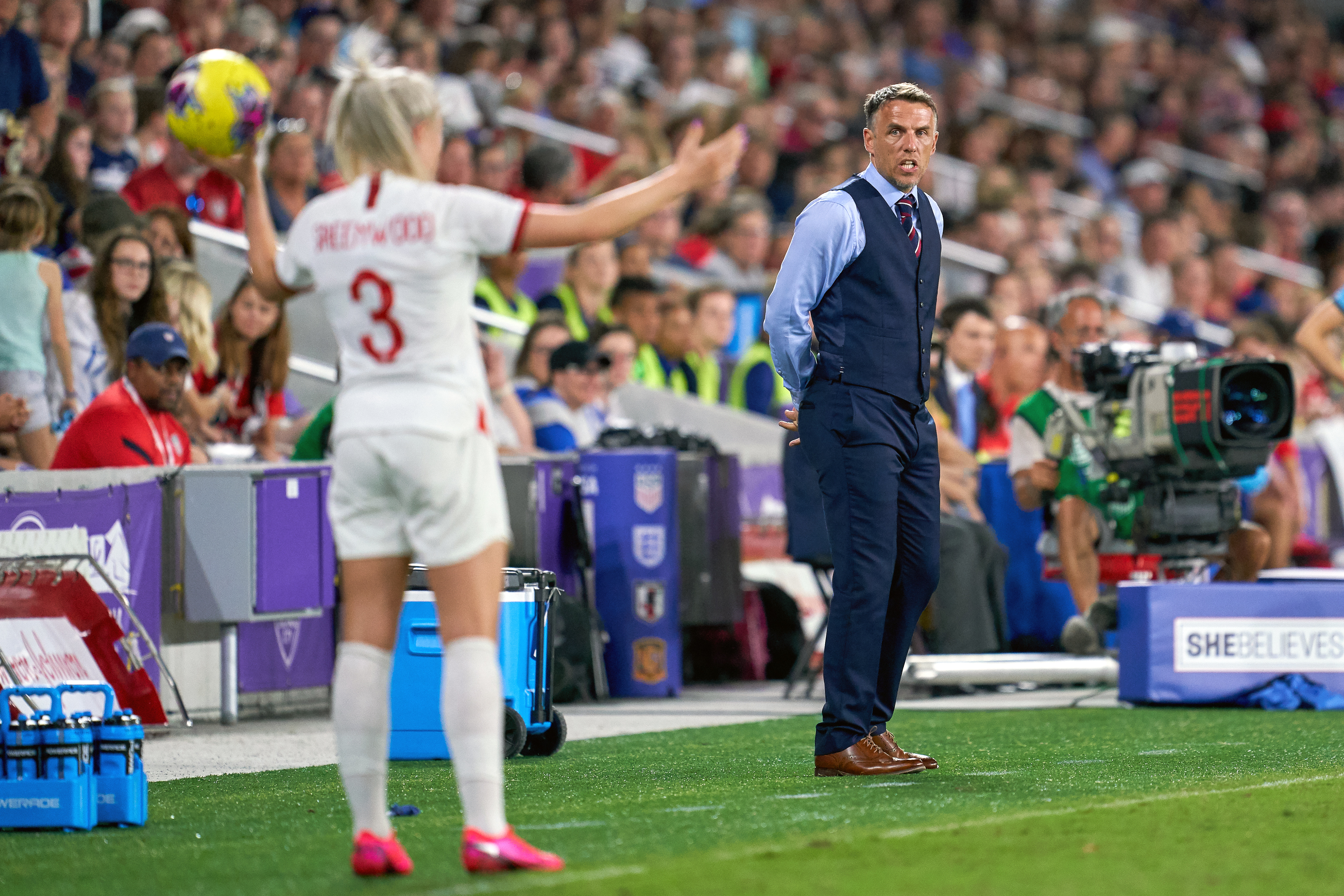Women's Euro 2022 favourites? Rise of the Lionesses: How England became the team to beat
England last hosted a major women’s tournament in 2005, when the landscape looked very different for the Lionesses. It’s taken snubs, blunders and heartbreak to make serious progress – but at Women's Euro 2022, Sarina Wiegman’s ambitious side have a nation dreaming of glory

One hundred and three days before England’s women kicked off their first home major tournament in history, the announcement came. In some ways it was surprising; in many others, depressingly not.
“Our resources are better deployed at the level of school-age children rather than adults,” Manchester United’s director of communications, Philip Townsend, droned in a February 2005 statement. Just three months before the north-west of England was due to host 15 matches at Euro 2005, world football’s richest club had just announced that they’d be disbanding their women’s team. For a sport still toiling to catch up after an astonishing 50-year FA ban until 1971, it felt like a stinging slap to the face.
Nevertheless, look back on the seminal moments of Lionesses history and that home tournament 17 years ago represented significant progress for women’s football in Britain. It might not have been a glitzy stravaganza for the ages, only eight teams competed, one of its venues was actually a rugby league ground and England went out in the group, but still: Euro 2005 arguably sowed the first seeds for real growth on these shores and offered hope that women’s football didn’t need a Manchester United to potentially thrive.
If ever proof was required that they rank among the Women's Euro 2022 favourites, all three of England’s group matches had sold out by the middle of April – not least their opener at the 73,200-capacity Old Trafford. Tickets for the final were available for all of 43 minutes. This summer feels half a world away from the last time England hosted a major women’s tournament, but back then at the start of a journey, things were no less exciting for those involved. And like all good stories, this one begins in Topshop…

Running with the wolves
“Do you want me to tell you how I got called up for that Euros?”
We’ve barely started chatting to Karen Carney, but she’s already grinning like the 17-year-old kid she was in 2005. “I was at a boarding school on an FA scholarship, but missed the last two lessons of college to get the train back home and go shopping at the Bull Ring,” she remembers. “A number kept ringing me – I thought I was in trouble because I’d bunked off, so kept ignoring it. Then Alex Scott rang to ask if I was in the squad, which I didn’t think was being announced for another two days. I was in Topshop and called the number back. It was Hope Powell. She didn’t say much, just, ‘You were the hardest person to get hold of – you’re in’. The lessons are don’t bunk off school… and pick up when the England manager calls.”
Certainly, these were simpler times for everyone. Carney went on to become the Lionesses’ third-highest-capped player of all time and represent them at eight major tournaments, but Euro 2005 was the start of something for an excitable teenager getting her first major break. She wasn’t the only one.
Get FourFourTwo Newsletter
The best features, fun and footballing quizzes, straight to your inbox every week.
“I’d started covering women’s football for the BBC in 2004,” remembers Jacqui Oatley, who commentated on her first three matches on national radio at the tournament. “In the build-up, there was only really a tiny press pack of three – Tony Leighton of the Guardian and Pete Lansley from The Times. Weirdly, all three of us are from Wolverhampton, but there was this tiny little gang of us that used to travel all over Europe following the England women’s team. Even though I was a ‘neutral’ journalist, I desperately wanted them to do well. We all did.”
England’s opener at the City of Manchester Stadium offered the first sign of things to come – back then, the 29,029 attendance was a Women’s European Championship record. For context, two years earlier at the World Cup, group stage crowds for hosts USA had ranged from 34,144 to 22,828.
Those who showed up against Finland weren’t disappointed – except an overworked Oatley on her big commentary debut, that is. “My main memory of that game is, ‘Oh God, the Finns have all got blonde ponytails’,” she winces. The Lionesses raced into a two-goal lead before half-time, only to be pegged back level with only two minutes to spare. Their heroine of the hour proved to be a Topshop-loving teenager who only two hours before the game had been studying for her A-Levels.
“It came to me off a rebound – I think if me and Eni [Aluko] sat down as pundits now, we’d say she should have scored!” Carney says. “But then I just put it in the only place I could. There was a lot of emotion for me in that game, as my mum had cancer at the time. I ran off in the celebrations and swore on national TV – she was annoyed and sent me to church to apologise to Father.”
Sadly, the good times weren’t to last: in their next game, England took the lead against Denmark before conceding twice in the final 10 minutes. In their final fixture, an early goal conceded against Sweden consigned them to the bottom of an incredibly tight group.
The FA were pleased, though. Just 957 people huddled into Preston’s Deepdale for France vs Italy, but roughly 2.4m had watched each England match on the telly. “The future’s bright,” beamed spokesman Alex Stone. “If you look at the crowds and media coverage, it’s been phenomenal. Just under 70,000 people came to watch England’s three games and it was way beyond our original expectations.”
It was a promising start. Ultimately, full professionalism was still a way off for any of the squad who weren’t called ‘Kelly Smith’; so much that Fara Williams, England’s would-be record cap holder, had spent her 21st birthday in a homeless shelter only that January. By the 2007 World Cup, England’s second in history, Smith was still the first and only English player to have played professionally in the US. Domestically, the game was still suffering – after Charlton’s men had been relegated that summer, the Addicks cut costs by scrapping their entire women’s operation. Ultimately, it showed in China; despite a solid group showing that included a goalless draw with Germany and 6-1 thumping of Argentina, England had succumbed to a 3-0 loss against the USA within an hour.
Behind the scenes, frustration was brewing. “The FA invited those of us who’d covered the tournament to a dinner with the players,” remembers Oatley. “One of the players told me in conversation about the financial nightmare they’d been having – they’d been out there for five weeks. When she told me what their fee was, I worked out that it was £40 a day. That didn’t cover rent, mortgages and whatever else, so some of the players were having to cut back on training.
“Eni Aluko wasn’t the player who’d told me originally, but she was brave enough to go on record, so we ran the story. It wasn’t meant to stab the FA in the back at all, it was more to raise awareness. If these players were coming back after a major tournament where they’d done pretty well, how on earth was the game going to progress? Those really good people working at the FA – many of who are still there – wanted the same thing.”
As star striker Smith summarised, “The USA are training with the ball every day and playing as a team, whereas we’re not anywhere close to them in terms of their salaries – so it is a little bit frustrating. What would happen if we did have that money coming in – how far could we possibly go?”

Exit hope
It took some time – until May 2009, three months before the next Euros – but a landmark moment arrived when the FA announced central contracts for 17 female players. Salaries of £16,000 weren’t enough to celebrate alone, but it certainly helped. Meanwhile, five others – Carney included – were now playing professionally in the States.
“It took the pressure off the players to be able to train more,” she says. “Before, they might have been working 40-plus hours a week, playing on the weekends after training 8-10pm at night. They’re incredible humans and probably don’t get the respect that’s due for what they’ve done to help make this generation.”
At a 2009 Euros expanded to 12 teams, England went all the way to the final after squeaking through their group in third place. The mighty Germany proved too strong in the final, however, running out 6-2 victors despite Carney cutting the deficit after half-time.
“We were laughing because the German players got 25 grand if they won – we were like, ‘What’s a bonus?!’” the former winger chuckles. “It was like, ‘We’d probably run like they did if we were getting that!’ But really, we gave everything – they were just the dominant team back then, physically and technically better.”
It extended the Lionesses’ winless run against the Germans to some 20 matches, and ensured the bridge to world football’s better-resourced nations remained a frustratingly long one. Pleasingly for the FA, though, progress still seemed to be creeping along: at the 2011 World Cup, England topped their group and beat Japan 2-0 via a gorgeous lob from 22-year-old forward Ellen White, but bowed out on penalties to France in a heartbreaking quarter-final.
Then came the Olympics. In what felt like another huge episode, Great Britain saw off Brazil 1-0 to cap a perfect group in front of 70,584 at Wembley. The first knockout stage brought a 2-0 defeat to Canada, but the groundswell of support was palpable. Was it <i>the moment that everything changed?
“No, again I think it was 2005,” says Carney. “I really do think it had a big impact, because then we added investment when we qualified for the World Cup. Then we could go and push for the Euros in 2009, and then we got the buzz of 2012. That was definitely up there, but I always believed that we could get support in the single moments. It was more whether could we do it on a regular basis.”
The following year provided yet more seismic change for the Lionesses: after a dismal showing at the 2013 Euros when they suffered their first defeat by Spain for 17 years and were hammered 3-0 by France, Hope Powell’s 15-year reign was brought to a crashing halt. For some, it was overdue – although she’d fought hard for her country for two decades, her omnipotence within the FA and hardline management style wasn’t always popular.
“You go through cycles in football and we’d probably come to the end of ours,” says Carney. “But I felt bad for Hope because of how much she’d done. She was strict – in the younger age groups I was petrified of her – but she taught me about standards and how to be a professional.”
Unfortunately for England, though, Powell’s replacement – Bristol Academy’s 31-year-old boss Mark Sampson – was no triumph for due diligence. In 2017, the Welshman survived a stormy episode with Aluko that led her accusing him of “bullying and discrimination” (Sampson denied the claims and was cleared of wrongdoing by two investigations), but his sacking came just months later after “clear evidence of inappropriate and unacceptable behaviour by a coach” during his Bristol days. In 2014, it had been ruled that Sampson “did not pose a risk working in the game”, but the Women in Football group said questions over his suitability had been raised before his hiring as Lionesses boss. Carney doesn’t want to discuss him today, but has a particularly fond memory from Sampson’s tenure as coach.
“Beating Germany in the bronze medal match at the 2015 World Cup was huge,” she says. “I think they were probably a bit wounded from losing their own semi-final, but we’d never beaten them. We shifted a gear and went to places that we’d never been before.”
With 24 teams competing for the first time in Canada, England had roared through the competition despite another defeat to France in the group – Lucy Bronze’s stunner helped them beat Norway in the last 16, before they knocked out the hosts with a superb 2-1 win. The semi-final against Japan kicked off at midnight, but 1.7m viewers tuned in to watch a crushing exit as Laura Bassett’s 92nd-minute own goal condemned England to defeat.
“I think the players had a real mental block about playing the big teams for a long time – it was about breaking those down as much as anything,” says Oatley. “I was presenting that tournament from back here in England; social media had become a lot bigger then and I felt like it really got through to the audience. It was the first tournament I noticed where people were talking about the actual football really knowledgeably, and not just about the growth of the game.”
You Phil up my senses
One by one, the Lionesses were mauling their demons. In 2017, they were narrowly beaten by France (in the 95th minute) and Germany at the SheBelieves Cup, but saw off the USA in New Jersey in between.
At that summer’s Euros, they became the first England team since 1982 – male or female – to finish a group with a perfect record; latecomer Jodie Taylor was the first women’s player to score a hat-trick in a major tournament, against Scotland, en route to the Golden Boot. Then came the big one: a rotten, 43-year run of misery against France finally ended as Taylor’s 60th-minute goal secured passage to the semis. There, Sarina Wiegman’s Netherlands dished out a painful 3-0 defeat.
After the embarassment of Sampson’s exit shortly afterwards, Phil Neville hardly looked like the inspiring arrival that England craved to take them one step beyond. Having managed only one senior game as manager up to that point, for Salford against Kendal Town in 2015, the reaction to his appointment was muted at best.

“At first I think we all were a bit sceptical, if I’m honest,” admits Carney. “But Phil grafted: he knew the players, he knew the league. It wasn’t a bad thing that he was coming in with fresh eyes. What I really liked was that he simplified things by saying, ‘I want to play this way and we’re going to do it like this’. I think if you look at individuals, you have to say they reached levels that they probably hadn’t previously. We were so close...”
You can tell it still hurts thinking back to 2019. Three years ago, playing at her eighth and final major tournament with England, Carney was part of the most accomplished Lionesses side yet; one which strolled to the semi-finals with a perfect record before encountering the USA in Lyon.
“We went out after missing a late penalty,” she says of the gut-wrenching 2-1 loss, watched by a mammoth 11.7m audience on the BBC. “But no team had got as close to them as we did. At full-time, Jill Ellis [their manager] came up to me and said, ‘You guys are a great team – you pushed us to limits we didn’t think we could go to’. Phil came in and gave us that confidence. Culturally in the past, even within the men’s team, I don’t think we’ve always believed. We’ve had three semi-finals now, and we’re getting closer and closer. Is it meant to be that we get to a final at our home tournament? Was everything built for this path now?”
We’re about to find out. Already, this feels very different to previous years – Germany won’t be going in as defending champions for starters, having relinquished their brutal stranglehold on the competition in 2017. “It’s less predictable,” says Oatley. “Now I think Spain have really come into their own – they were nowhere to be seen when England started. It’s beautiful to watch the Dutch, too. Again, their first major tournament was Euro 2009, and now they’re the defending champions who also reached the World Cup final. A lot of nations have emerged.”
Since 2017-winning manager Wiegman replaced Neville in November, following his exit to Inter Miami, the Lionesses were unbeaten in her first 11 matches up to June’s Euros warm-ups – including a victory over Germany and draws with each of Canada and Spain. “Sarina is experienced and won it on home soil herself in 2017, so she knows how to deliver,” says Carney. “The levels between the best and the rest are small now. There are probably four or five teams who will be wary of others, but we’re in that category – the difference we’ve got is home advantage. I saw what that can do in 2005 at that opening game.”
This time, though, more than twice as many fans will cram into Old Trafford as history is made when the Women's Euro 2022 kicks off on July 6. The Lionesses may have come far, but this summer a hopeful nation will pray they go further – where no other England side has ever gone before in Euros history. Let the fun begin…
Joe was the Deputy Editor at FourFourTwo until 2022, having risen through the FFT academy and been on the brand since 2013 in various capacities.
By weekend and frustrating midweek night he is a Leicester City fan, and in 2020 co-wrote the autobiography of former Foxes winger Matt Piper – subsequently listed for both the Telegraph and William Hill Sports Book of the Year awards.

